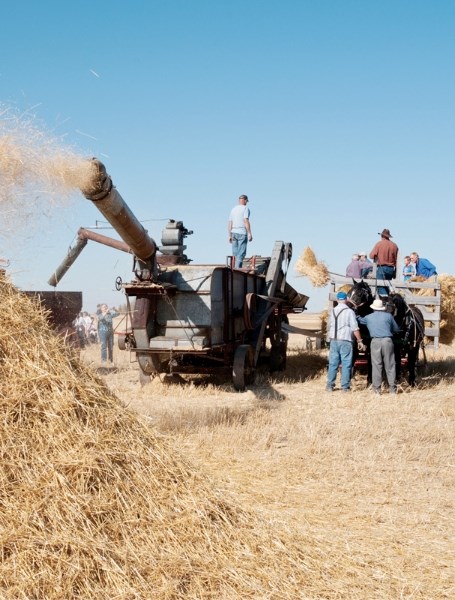Carstairs-area residents had a rare opportunity to take a look into the past recently, as Lyle Brown, who farms on a piece of land east of Carstairs in Mountain View County, brought out his grandfather's old threshing machine for a good cause.All the grain that was processed in the antique machine on Saturday, Sept. 29 was donated to the Canadian Foodgrains Bank (CFB), along with the proceeds of cash donations collected at the event.“We've kind of done that over the last 10 years, just about every year,” said Brown. “It's kind of a heritage thing that we like to keep up.“My father used to do the threshing. At that time we never did it for the CFB, but a few years ago we thought, ‘Well we should have a focus.'”So for the last 10 years, Brown has gathered friends, family, and neighbours for the get-together, doing things exactly how they were done in decades past.The group brings in wagons, horses, pitchforks, and people to load the swaths of grain onto the conveyor belt and into the thresher.He noted that the machine, a 1927 George White threshing machine, requires a bit of maintenance each year, but everybody enjoys watching it go.“We do it because it's kind of a community event and people like to see that old equipment running. They like to see the horses and they like to get a little bit involved. It's lots of work but it's fun too.“And there's a lot of children that like to play in the straw pile; there was lots of stuff happening there.”One of Brown's favourite parts of the event was cutting the field down with an antique binder, which tied the bundles into the stereotypical grain stooks that stand up and can be picked up easily by one person.“I really enjoyed cutting it,” added Brown, “because I cut it with four horses on that binder. To cut those bundles was really something. I can't say that I had a favourite part though, I just enjoyed watching everything happen.”Eric Goerzen, another area farmer who loaded and delivered the threshed grain, and also donated some of his own wheat for the day, is also a volunteer for the CFB.He said the CFB's donations are matched by the Canadian government at a significant ratio.“If we get $1,000 of grain value,” said Goerzen, “then they match it 4-to-1 in the whole process up to the total amount that is allocated.”He added that the CFB is an organization that is made up of about 15 church groups. When a country is in need, due to droughts, storms, or other natural disasters, the CFB does an assessment as to what the country needs and how to best distribute what they ship over.“And one of the member organizations is most likely already in that country,” he noted, “so they use those organizations to actually move the wheat or pulses, peas or canola oil.“They can move it through existing organizations, they don't have to create a new organization to do this relief work, so the overhead is only five or six per cent used for administration.”The CFB has a great reputation as to how it handles relief work, which is why, he said, the government is so generous in its support.“They even sometimes use cash to buy commodities in the country where it's needed, instead of shipping stuff over and distorting the local market.”He said he experienced first-hand what the CFB was doing in Haiti during the aftermath of the earthquake, and “it really does work, it's a good organization.”The donation of grain totalled 280 bushels of wheat, with about $500 in cash and cheque donations, according to Goerzen.



